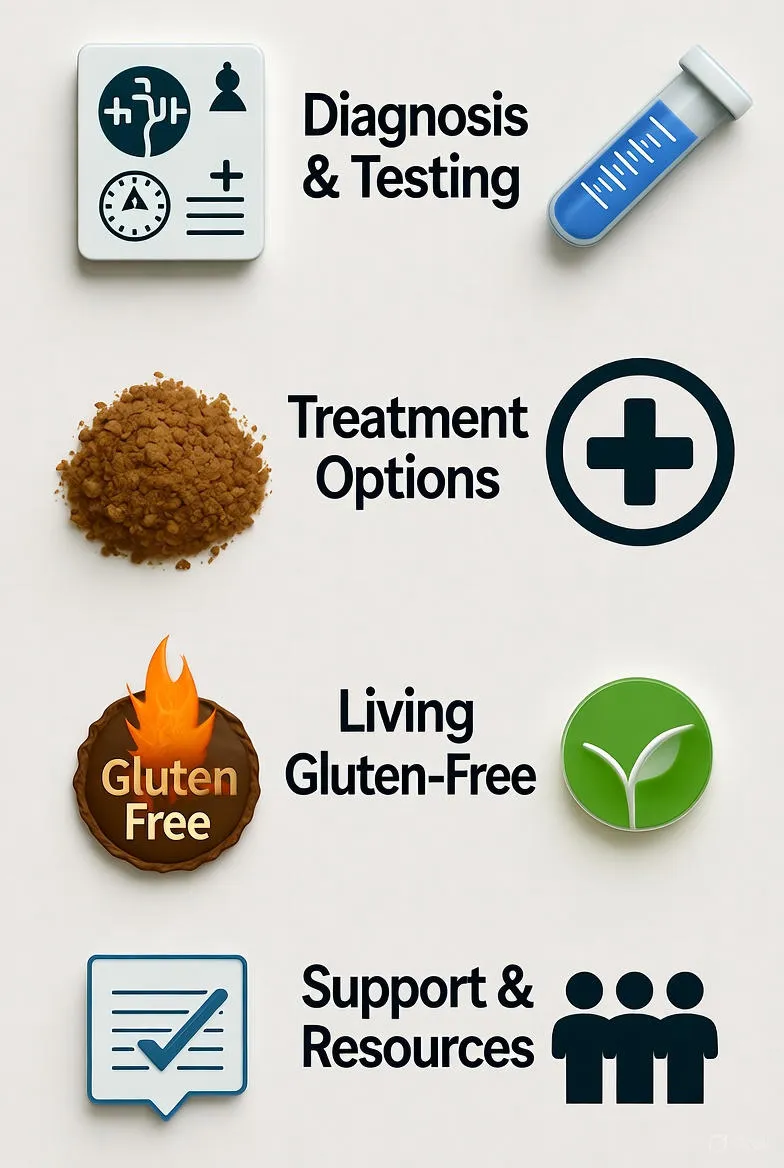Debunking Common Myths About Gluten Sensitivity: What Science Really Says
Uncover the truth behind common myths about gluten sensitivity. Learn the differences from celiac disease, health benefits, and practical tips for managing symptoms effectively.

Introduction to Gluten Sensitivity
Gluten sensitivity has become a hot topic in health and nutrition circles, with many people swearing off gluten-containing foods to alleviate various symptoms. But amid the buzz, misconceptions abound, leading to confusion and potentially unnecessary dietary restrictions. In this article, we'll explore and debunk some of the most prevalent myths surrounding gluten sensitivity, drawing on scientific insights to separate fact from fiction. Understanding these myths can empower you to make informed choices about your diet and health.
Myth 1: Gluten Sensitivity is the Same as Celiac Disease
One of the biggest misconceptions is that gluten sensitivity and celiac disease are interchangeable terms. While both involve adverse reactions to gluten—a protein found in wheat, barley, and rye— they are distinct conditions. Celiac disease is an autoimmune disorder where gluten triggers an immune response that damages the small intestine. This can lead to nutrient malabsorption, chronic inflammation, and serious long-term health issues if untreated.
In contrast, non-celiac gluten sensitivity (NCGS) does not involve the same autoimmune damage. People with NCGS may experience symptoms like bloating, abdominal pain, fatigue, and brain fog after consuming gluten, but tests for celiac disease come back negative, and there's no intestinal damage. The exact mechanism behind NCGS is still under research, but it's believed to involve innate immune responses rather than adaptive ones seen in celiac.
Confusing the two can lead to self-diagnosis pitfalls. For instance, someone with mild symptoms might assume they have celiac disease and adopt a strict gluten-free diet without medical confirmation, potentially missing out on proper diagnosis and treatment for underlying issues like irritable bowel syndrome (IBS).
Myth 2: Everyone Benefits from Going Gluten-Free
The gluten-free trend has exploded, with celebrity endorsements and social media influencers touting it as a panacea for weight loss, clearer skin, and boundless energy. However, the idea that everyone would benefit from eliminating gluten is a myth. For the vast majority of people—estimated at over 95%—gluten is harmless and even nutritious, as whole grains provide fiber, vitamins, and minerals essential for heart health and digestion.
Studies, including those from the Celiac Disease Foundation, show that gluten-free diets can sometimes lead to nutritional deficiencies if not carefully managed. Processed gluten-free products often contain higher levels of sugar, fat, and calories to mimic the texture of wheat-based foods, which can contribute to weight gain rather than loss. Moreover, without a true sensitivity, removing gluten unnecessarily might deprive you of beneficial gut bacteria that thrive on fiber from whole grains.
That said, for those with confirmed gluten-related disorders, a gluten-free lifestyle can be transformative. The key is personalization: consult a healthcare professional or registered dietitian to assess your needs rather than jumping on the bandwagon.
Potential Downsides of Unnecessary Gluten Avoidance
- Nutrient Gaps: Lower intake of B vitamins, iron, and folate commonly found in fortified wheat products.
- Increased Costs: Gluten-free alternatives are often 2-3 times more expensive.
- Social Challenges: Dining out or attending events becomes more complicated without clear benefits.
Myth 3: Gluten Causes Autism and Other Neurological Disorders
A particularly alarming myth links gluten to autism spectrum disorder (ASD) and other neurological conditions. This stems from early research on the gluten-free, casein-free (GFCF) diet for children with autism, but large-scale reviews, such as those published in the Journal of Autism and Developmental Disorders, have found no robust evidence supporting this connection.
The theory originated from observations that some children with autism also have gastrointestinal issues, leading to speculation about leaky gut syndrome allowing gluten peptides to affect the brain. However, subsequent studies using rigorous controls have debunked this, showing no improvement in ASD symptoms with gluten elimination. Similarly, claims about gluten causing ADHD, schizophrenia, or depression lack causal evidence; correlation doesn't imply causation, and many of these conditions have multifaceted origins involving genetics, environment, and lifestyle.
It's crucial to approach such claims skeptically. While diet can influence mood and cognition through mechanisms like inflammation reduction, gluten isn't the villain for most neurological issues. Parents and individuals should prioritize evidence-based interventions over unproven dietary overhauls.
Myth 4: All Grains are Bad if You're Sensitive to Gluten
Another common fallacy is that gluten sensitivity means avoiding all grains. In reality, many grains are naturally gluten-free and can be staples in a balanced diet. Oats, quinoa, rice, millet, and buckwheat offer similar nutritional profiles to wheat without the problematic protein.
Pure oats, for example, are gluten-free but often contaminated during processing, so certified gluten-free options are recommended for sensitive individuals. Ancient grains like teff and amaranth provide high protein and mineral content, making them excellent alternatives. By broadening your grain repertoire, you can maintain dietary variety and enjoyment without sacrificing health.
Research from the American Journal of Clinical Nutrition highlights how diverse, gluten-free grain intake supports microbiome health, reducing risks of constipation and promoting steady energy levels. So, sensitivity to gluten doesn't spell doom for grain lovers—it's an opportunity to explore global cuisines and nutrient-dense options.
Gluten-Free Grain Recommendations
- Quinoa: Complete protein source, rich in magnesium and iron.
- Brown Rice: High in fiber for digestive support.
- Sorghum: Antioxidant-packed and versatile for baking.
- Certified Oats: Beta-glucan for heart health.
Myth 5: Symptoms of Gluten Sensitivity are Always Immediate and Obvious
Many believe that if gluten is the culprit, symptoms should appear right after eating—like a dramatic allergic reaction. But gluten sensitivity often manifests subtly and delayed, sometimes hours or days later, making it tricky to pinpoint.
Common symptoms include not just gut woes like diarrhea or gas, but also extraintestinal ones: headaches, joint pain, skin rashes (like dermatitis herpetiformis in celiac cases), and even mood swings. A double-blind placebo-controlled challenge study in Gastroenterology confirmed that NCGS symptoms can emerge 24-72 hours post-ingestion, varying by individual.
This delayed response fuels misdiagnosis, as people might attribute issues to stress or other foods. Keeping a food-symptom diary and undergoing elimination diets under supervision can help, but self-experimentation risks inaccuracy. Professional guidance ensures you identify true triggers without undue restriction.
Myth 6: Gluten-Free Means Healthy and Weight-Loss Friendly
The halo effect around gluten-free labeling tricks many into thinking it's inherently healthier. Packaged gluten-free snacks and breads, however, frequently skimp on whole ingredients, loading up on starches, gums, and preservatives to achieve palatability. A study in BMJ found that gluten-free diets in non-sensitive individuals were associated with higher glycemic loads, potentially spiking blood sugar.
For weight management, focus on whole, unprocessed foods: fresh veggies, lean proteins, and those safe grains mentioned earlier. True health comes from balance, not blanket eliminations. If you're aiming for weight loss, pair gluten assessment with overall calorie awareness and exercise.
Myth 7: You Can 'Detox' from Gluten to Cure Sensitivity
Detox trends promise that a short gluten cleanse resets your system, curing sensitivity forever. Science says otherwise: there's no evidence for gluten 'addiction' or detox protocols reversing intolerance. The body doesn't store gluten like toxins; reactions stem from genetic predispositions or immune quirks.
Instead, gradual introduction or structured reintroduction after elimination can help gauge tolerance, but only under medical watch. Hydration, probiotics, and anti-inflammatory foods support gut health generally, but they don't 'cure' sensitivity. Long-term management is about adaptation, not eradication.
Navigating Gluten Sensitivity: Practical Tips
Beyond debunking myths, here's how to thrive if gluten affects you:
- Get Tested: Rule out celiac with blood tests and biopsy before going gluten-free, as dieting can skew results.
- Read Labels: Watch for hidden gluten in sauces, soups, and medications.
- Build a Support Network: Join communities like Gluten Intolerance Group for recipes and advice.
- Monitor Cross-Contamination: Use separate toasters and utensils in shared kitchens.
- Emphasize Nutrition: Supplement if needed with B12, D, or calcium to fill gaps.
By focusing on evidence-based practices, you can manage symptoms effectively without falling prey to hype.
Conclusion: Empower Yourself with Knowledge
Gluten sensitivity is real for some, but shrouded in myths that can mislead and frustrate. From distinguishing it from celiac to embracing diverse grains, armed with facts, you can tailor your diet confidently. Remember, health is personal—consult experts, listen to your body, and enjoy food as nourishment, not fear. If you've experienced gluten woes, share in the comments: what myth surprised you most?


